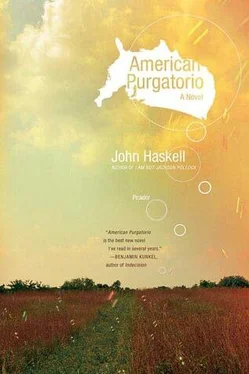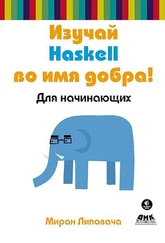John Haskell - American Purgatorio
Здесь есть возможность читать онлайн «John Haskell - American Purgatorio» весь текст электронной книги совершенно бесплатно (целиком полную версию без сокращений). В некоторых случаях можно слушать аудио, скачать через торрент в формате fb2 и присутствует краткое содержание. Год выпуска: 2006, Издательство: Picador, Жанр: Современная проза, на английском языке. Описание произведения, (предисловие) а так же отзывы посетителей доступны на портале библиотеки ЛибКат.
- Название:American Purgatorio
- Автор:
- Издательство:Picador
- Жанр:
- Год:2006
- ISBN:нет данных
- Рейтинг книги:3 / 5. Голосов: 1
-
Избранное:Добавить в избранное
- Отзывы:
-
Ваша оценка:
- 60
- 1
- 2
- 3
- 4
- 5
American Purgatorio: краткое содержание, описание и аннотация
Предлагаем к чтению аннотацию, описание, краткое содержание или предисловие (зависит от того, что написал сам автор книги «American Purgatorio»). Если вы не нашли необходимую информацию о книге — напишите в комментариях, мы постараемся отыскать её.
Los Angeles Times
American Purgatorio — читать онлайн бесплатно полную книгу (весь текст) целиком
Ниже представлен текст книги, разбитый по страницам. Система сохранения места последней прочитанной страницы, позволяет с удобством читать онлайн бесплатно книгу «American Purgatorio», без необходимости каждый раз заново искать на чём Вы остановились. Поставьте закладку, и сможете в любой момент перейти на страницу, на которой закончили чтение.
Интервал:
Закладка:
At any rate we began to kiss, first in the kitchen, and then we went to a little room down the hall. We did all the things we had to do to cross the membrane. I helped her remove her sweater, which got stuck around her wrists, which led to more kissing. I kissed her ears and her full lips. I kissed her neck and when she told me to kiss her stomach I kissed her intertwining arrows. And there must be a million kinds of desire, and we were exploring, through thin cotton material, one of them.
It’s hard to experience desire while at the same time controlling it. We were trying to lose control, and when she took my head in her hands we thought we were on our way. We were kissing each other and holding each other and rolling on and off each other, slowly then vigorously, like two too solid worlds trying to come into each other. We were moving purposefully, into and against each other, but nothing seemed to be happening. Nothing was giving way. The thing that should’ve given way wasn’t doing it. She was holding the top of the bed, her eyes falling back into her eyelids, and we were trying to follow our desires, such as we understood them, and we could tell we were close to something, but we weren’t breaking through. I with my tongue, and she with her whole damp body, were struggling against some force inside that body, and inside mine, stubbornly blocking access to something we wanted.
And what we wanted wasn’t bad. But what we needed was something else. I needed to be with Anne and she needed … I don’t know what she needed but because we wanted a certain experience, and because we felt we were close, we kept working, on and on, and we were feeling sensations, but they were less intense. We felt them, but less so, and then less so, until pretty soon we weren’t even doing what we had been doing anymore. We were doing something else. It wasn’t bad, but it wasn’t what we needed.
We thought maybe we needed to sleep. We were too tired, we thought, or too wide awake, we thought, and maybe we just wanted to go to sleep. We kissed each other, tenderly, like workers coming out of a mine, and then we tried to go to sleep. We thought maybe that was what we needed.
Brigitte Bardot is basically forgotten now, and even in her prime she was notable less for the films she acted in than for the flamboyant sexuality she exhibited in her life. She was, in her time, the symbol of sex, and because she had so much desire, she was also a symbol of that. And why not? Desire had been planted in her — for attention, affection, admiration — and she acknowledged all that and tried to fulfill it, which is why she was famous.
And while those desires were fulfilled, the need she had behind those desires was still there, immanent in the compulsion she felt to keep repeating. Desire exists for itself, in its own delirious state of dissatisfaction. Which is why rich people never have enough money. It’s why Brigitte Bardot achieved her reputation, but not the cessation of her desire.
She saw a man and she experienced a feeling that she called desire. That man would soon become her lover. And every time she did this, after a certain time had passed, the desire for that particular person waned. The desire itself was there, but the object of the desire shifted. It seemed to disappear, but when she saw another man, there it was. She felt it again, and she spent years of her life trying to fulfill that feeling.
But the feeling she had existed in a world she was unfamiliar with. She was fulfilling the thing she thought she wanted, but the necessary thing existed in another world.
Feather and I, in our separate worlds, were trying, unsuccessfully, to sleep. We tried to sleep but after a while we realized we weren’t sleepy. I certainly wasn’t. And thank god for sexual desire because, although she wasn’t moving much, everything she did, every in-breath and out-breath, I was aware of. I brushed her hair away and kissed her shoulder, then her back and the soft hairs on the small of her back down to her buttocks, and when she rolled over I kept kissing, and when she tossed her head back and cried out in what’s normally called ecstasy, we thought we’d done it.
And we had. We had done it. We felt we’d done the work. But like Brigitte Bardot every time she temporarily eased her desire, we hadn’t broken through. We were flushed, our faces were, but we were not completely satisfied. Whatever the necessary thing was, we weren’t doing it.
So we stopped. We fell back on the small bed, staring up into the ceiling and feeling the presence of a world we weren’t part of.
Then, as if on cue, we both sat up. We sat on the edge of the bed. It was chilly so we covered ourselves with the blanket. We huddled together like that for a long time, looking down at the rug on the floor, and no one said a word.
The two worlds resist coming together, and yet at the same time, there’s only one world.
Feather spoke first. She said, “I feel like there’s a wall around me.”
“A wall of what?” I said.
Our thighs and shoulders were touching, but we weren’t looking at each other. “It’s glass,” she said. “I can see what’s out there and hear things, but I can’t touch anything, or if I do I’ll shatter the glass.”
“What would happen if you did?”
“If I shattered the glass? The glass would break.”
And that was all we said.
We sat like that a while longer, not speaking. Then we heard some birds outside. And I’m not saying that sitting there we shattered any glass because that would be too dramatic a description of what happened. What happened was that somehow what we wanted and what we needed, for a moment, were the same thing.
7
But then the moment was over and I was back to wanting something else. I’d already gone to another moment, thinking about the possibility of that upcoming moment. However much I tried to accept the moment as it was happening, to twist my mind into the fact of acceptance, I still wanted something else.
By the time I leaned over and kissed Feather on her forehead she was almost asleep. I got dressed, left her in the room, and drove my car into town. I parked on a neighborhood street near a health food store, bought a carrot juice, and spent the rest of the morning sitting in my car, watching the street.
With Anne, I thought, there was love. Not a passing desire, but something solid and true, and thinking this, I realized I hadn’t been looking for Anne, not very diligently, and I thought that I should. I thought I ought to make a systematic search of every street in Boulder. But when the morning light brought the people out and onto the street I got out of my car and joined them. I walked along the pedestrian mall, noticing the drains laid in the concrete, and the plants planted in good mulchy soil. I saw the sprinkler heads at the edge of the soil, and I sat on one of the benches, still holding my carrot juice. People were walking by, and I could see that they were noticing me, but mostly they didn’t make contact. They kept walking.
I was sitting on this bench in the middle of this pedestrian mall, literally in the center of what would have been a street, but I barely felt that I was there. I was watching the people, who were either watching other people or looking at shoes in the shoe store windows. Right about then a girl sat on the other side of the bench. She had a garbage bag stuffed with laundry and she sat on the bench and we started talking. She had brown hair, tied back, and we talked about New York and deforestation and about hair. I asked her if “brunette” meant the same as brown. We talked about waitressing and copy editing, and at a certain point in the conversation she mentioned that her cat had died. To me it wasn’t a monumental problem, but I was thinking that it probably meant something to her, and when she said she needed someone to help bury her cat, I volunteered.
Читать дальшеИнтервал:
Закладка:
Похожие книги на «American Purgatorio»
Представляем Вашему вниманию похожие книги на «American Purgatorio» списком для выбора. Мы отобрали схожую по названию и смыслу литературу в надежде предоставить читателям больше вариантов отыскать новые, интересные, ещё непрочитанные произведения.
Обсуждение, отзывы о книге «American Purgatorio» и просто собственные мнения читателей. Оставьте ваши комментарии, напишите, что Вы думаете о произведении, его смысле или главных героях. Укажите что конкретно понравилось, а что нет, и почему Вы так считаете.











